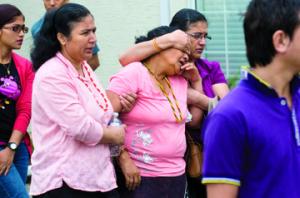LETHBRIDGE HERALD (21st July 2012)
kmay@lethbridgeherald.com
 He came to Lethbridge on the promise of a better life – a promise that has now been broken, say those close to 26-year-old Bhutanese refugee Deu Raj Puri, who was shot and killed by Lethbridge police officers earlier this week.
He came to Lethbridge on the promise of a better life – a promise that has now been broken, say those close to 26-year-old Bhutanese refugee Deu Raj Puri, who was shot and killed by Lethbridge police officers earlier this week.
About 100 mourners paid their respects during a funeral service in Lethbridge Friday morning, watching as the Puri family – including Deu Raj’s parents, four brothers and two sisters – said goodbye to their son and brother by strewing rose petals and colourful scarves over a yellow-draped stretcher as part of Hindu final rites.
A single black and white photo of Deu Raj, projected on the funeral home wall in front of those who knew him, showed a serious-looking young man with unsmiling eyes.
Deu Raj spent most of his life in a refugee camp in Nepal after his family was exiled from their home in the South Asian Kingdom of Bhutan and fled to escape persecution, along with thousands of other southern Bhutanese.
He and his family moved to Lethbridge eight months ago, and Deu Raj began taking classes in English as a second language and found a seasonal job as a farm worker, according to family friends.
“He was a sincere guy,” said Mon Khadka, a neighbour who played soccer with Deu Raj on the weekends, remembering him as quiet and earnest. “He played well.”
Deu Raj wanted to become fluent in English so he could get a full-time job, get off government assistance and carve out a life for himself, said Abi Adhikari, a fellow Bhutanese immigrant who knows the Puri family through his work as an interpreter.
“He wanted to make his living,” he said. “He was having the dream to live independently by himself.”
But Deu Raj struggled to adapt, grappling with depression and alcoholism; a common side effect, Adhikari says, of “human warehouses” – his term for refugee camps.
“He was depressed because he was warehoused for 20 years without the opportunity to do anything. Then, the alcohol maybe became his friend to live that life. And many of them (other refugees) have the same situation in their communities.”
On the night Deu Raj died, friends say, he’d cut himself with a knife and was threatening to kill himself. It wasn’t the first time he’d tried to commit suicide, but this time when his family called police for help, they couldn’t have predicted officers would use deadly force.
“The family (thought) that if we call the police then he will get better assistance, he will get protection,” Adhikari said. “He was not able to understand what officers were saying to him at that time, so he was just, maybe, confused.”
Two Lethbridge regional police officers showed up at the Puri’s home in Columbia Bay West just after 11 p.m. last Sunday. Police have released few details about what happened there, except they were responding to a weapons complaint and that they found a knife on scene. Both officers fired shots at Deu Raj, killing him.
The Lethbridge Regional Police Service is under investigation by the Alberta Serious Incident Response Team – an independent organization responsible for investigating cases where police have caused serious injuries – to find out whether the two officers acted properly when they fired at Deu Raj. If investigators find the officers wrongfully killed him, they could face criminal charges.
Anxious for answers, many in Lethbridge’s Bhutanese community – the city’s fastest-growing immigrant population with more than 500 new residents – have said they’re now afraid to turn to the police for help.
“Is there a need to bridge the gap between the Bhutanese communities and the authorities, as many are already contemplating whether to call for help or not, for the fear of similar situations?” Canadian Bhutanese Society president Hemlal Timsina read from a prepared statement during the service, the remainder of which was in Nepalese.
“I believe we need a proper closure or explanation from the authorities to this tragic event. To walk us through this difficult time we also need help from the mainstream society and the assurance that this will not be repeated in the future.”
